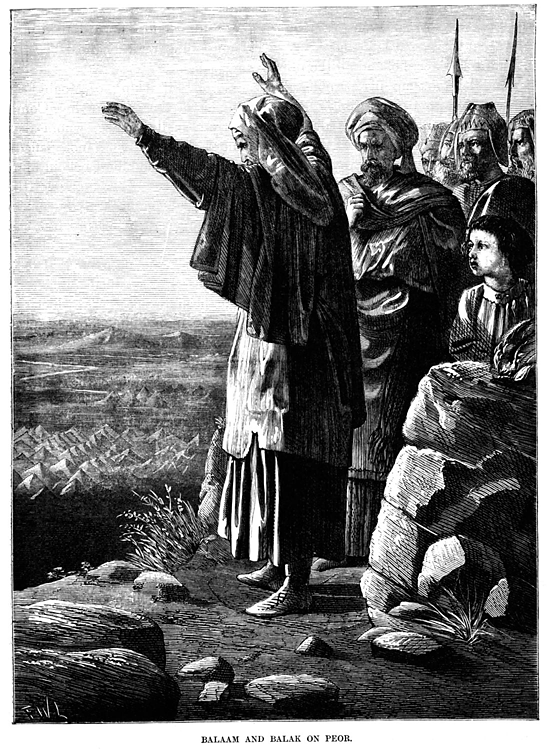
In Matthew 24 and elsewhere, Yeshua warned his disciples to beware of false prophets coming in the end times claiming to be anointed and have the word of Elohim from heaven and deceiving many—even the saints. Many of these false prophets have started false religions and cults, but can be found lurking about in the Christian church itself. There are many people running around claiming to speak for Elohim, but who are coming in the spirit of Balaam. Beware! That’s why it behooves us to study about Balaam the false prophet!
Then many false prophets will rise up and deceive many. (Matt 24:11)
For false christs and false prophets will rise and show great signs and wonders to deceive, if possible, even the elect. (Matt 24:24)
Beware of false prophets, who come to you in sheep’s clothing, but inwardly they are ravenous wolves. (Matt 7:15)
Numbers 23:4, Seven altars. Rashi, the Jewish Torah scholar, says these seven altars refer to the altars built by Israel’s ancestors—four of which were built by Abraham (The ArtScroll Sapirstein Edition Rashi/Numbers, p. 288). Whether this is true or not, this story can serve to teach us a lesson. Perhaps Balaam superstitiously thought that by returning to some place where humans in times’ past had encountered the Presence of YHVH he could actually find YHVH there. Matthew Henry in his commentary on this verse states, “Oh the sottishness of superstition, to imagine that God will be at man’s beck!” To resort to programs, rituals or methodologies to “conjure” up the Presence of YHVH can lead to idolatry and witchcraft. What “attracts” the Spirit of YHVH? Is it worship, praise, a repen tant and humble heart, faith in him with obedience to his Word, and love for him or rituals, charms, incantations and religiosity? You know the answer.
Numbers 23:21, Perverseness in Israel. Balaam tried to find some iniquity, or some perversion in Israel that would give him legal grounds to curse Israel, but could find none. Remember, a curse causeless shall not land (Prov 26:2). Satan, the accuser of the brethren (Rev 12:10) has no legal grounds with which to attack the righteous of Yeshua who are submitted to the authority, will, Word and Spirit of YHVH (Jas 4:7), and who are under the blood of Yeshua, the Lamb of Elohim (Rev 12:11). How do we stay in such a spiritual state so that the attacks of the enemy have no legal ground to stick in our lives, and so that the fiery darts of Satan are instantly quenched? (Read compare and discuss Eph 6:10–18; Col 2:15; Luke 9:1; 10:19.)
Numbers 23:15–25, The arrogant hypocrisy of Balaam. Balaam calls YHVH “the Most High” and “the Almighty.” He had great respect for YHVH (as does Satan as we learn from James 2:19, “You believe that there is one Elohim, you do well: the devils also believe and tremble.”), but he did not have enough fear of, faith in and love for YHVH to obey him. Does this describe you? How much do you hold back loving YHVH with all your heart, soul, mind and strength?
Numbers 23:19, El is not a man that he should lie.Read the rest of this verse, which speaks about the immutable character of Elohim. (Also see Mal 3:6; Heb 13:8.) From the beginning in the Garden of Eden (thanks to the lies of Satan the serpent, see Gen 3:1–4), man has been under the spiritual delusion that Elohim changes his word, laws or commandments and that he doesn’t really mean what he says. That is to say, when YHVH gives a command, later on he may change his mind and his commands are no longer applicable to subsequent generations or people-groups. Down through the ages, church leaders have bought in to this lie of the enemy with regard to validity of the Torah as pertaining to the life of the redeemed believer. But by saying that the Torah is “done away with,” “has been nailed to the cross” “has been fulfilled in Jesus” meaning “he did it for us so that we don’t have to do it,” isn’t this really calling Elohim a liar? Now consider the numerous places throughout the Bible, the Word of Elohim, where the Torah is revealed as YHVH’s unalterable standard of righteousness for all time and for all people everywhere. (In this regard, read the following scriptures: Ps 119:44, 142, 144, 160, 172; Matt 4:4; 5:18–19; Rom 3:31; 7:12.) Who is really the liar? Man or Elohim?
Numbers 23:36, Balaam the man-pleaser. Balaam is desirous of pleasing Balak, even though he pretends to please YHVH. At heart Balaam is a man-pleaser, not a YHVH-pleaser. Yeshua castigated the religious hypocrites of his day for the same thing (John 12:43). What truly motivates you? Do you care more what men think when it comes to obeying the truth of YHVH? Do you often take the easy way out and the path of least resistance, which pleases the flesh and those around you rather than YHVH?
Numbers 24:2, The Spirit of Elohim came upon him.We see from the Scriptures that the Spirit of YHVH can come on just about anyone, but this doesn’t mean that the Spirit dwells in them, leads them, or that such a person has a heart to love, serve and obey Elohim. For example, the Spirit of Elohim came upon King Saul who prophesied (see 1 Sam 10:9–11; 19:20–24), but Saul didn’t serve YHVH with his whole heart and eventually became a murderous, apostate occultist. Not only does the Bible warn us to beware of prophets who prophecy falsely (e.g. Deut 13:1–5; Jer 23:9–40; Ezek 13:2; 22:24; Isa 28:7; Matt 24:4–5; 2 Pet 2:1–3), but to beware false prophets or unrighteous individuals who YHVH may use to prophecy correctly—not because they are filled with the Spirit of Elohim, but simply because the Spirit of Elohim temporarily comes upon them to accomplish YHVH’s purposes.
Numbers 24:3, Balaam…hath said.In this statement, we see revealed another character flaw of Balaam. Here he gives YHVH no credit for his prophetic word, but seeks his own glory. It’s as if he is saying, “I have heard the word of Elohim” with emphasis on himself rather than on Elohim, the source of the word. What caution does the Word of Elohim give us in this regard? (See Jer 9:23–24.)
Numbers 24:17, A Star out of Jacob.To what notable, kingly biblical figure is this prophecy referring? (See Matt 2:2; Rev 22:16 cp. Ps 2:1–12; Rev 17:14; 19:16. See also Rev 2:27; 12:5; 19:15.) This prophecy can have a double meaning in that it also pointed to King David who smote the Moabites and took possession of Mount Seir, the land of the Edom (vv. 17–18 cp. 2 Sam 8:2,14).
However, both Christian and Jewish scholars have recognized the Messianic implications of this verse. For example, Akiva Ben Yosef, the rabbinic Jewish leader of the second century, applied this verse to Simon Bar Kosiba (whose name he changed to Kokhba meaning “son of the star” after the Star Prophecy of Num 24:17) who presumed to be the Messiah when he unsuccessfully attempted to defeat the Romans in the Second Jewish revolt. Additionally, Adam Clarke notes in his commentary on this verse that Moses Ben Maimon (or Maimonidies), the Medieval Jewish Torah scholar applied this verse to the future Messiah as do the Onkelos Targum and Jerusalem Targum (the ancient Jewish Aramaic translations of the Tankah). Rashi (the medieval JewishTorah scholar) and Sforno (the renaissance Jewish Torah scholar) in their Torah commentaries note the Messianic implications of the star of Balaam’s prophecy as well (Sforno Commentary on the Torah, ArtScroll Mesorah Series).
One thing is certain, only Yeshua the Messiah can make the claim to having fulfilled this biblical prophecy!
Balaam—A Subverter of Divine Gifts and a Prophet of Babylon

The name Balaam means “destruction of people.” The Hebrew word bela means “destruction, confuse, confound.” The Hebrew word am means people, tribe, nation. The name Balak means “waster, to annihilate.” He was king of Moab; distant cousins to Israel through Lot, Abraham’s nephew. The world, as well as the modern Christian church, is full of such prophets.
Continue reading
